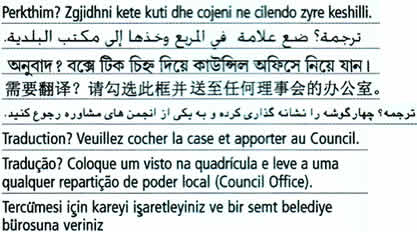The image below shows the languages into which Brighton & Hove Council translates documents. Something like this appears on most council documents. Can you identify the languages?

The image below shows the languages into which Brighton & Hove Council translates documents. Something like this appears on most council documents. Can you identify the languages?

Comments are closed.
Second is Arabic.
Third is probably some Indian language. (Tamil?)
Fourth is Chinese.
Fifth is Persian.
Albanian
Arabic
Bangla (bengali)
Chinese
Farsi (persian)
French
Portuguese
Turkish
I was going to say the same as AR, only with Urdu instead of Farsi.
Interesting!
Just today I was looking at a similar list of languages at an American hospital, which provides translators for patients who do not speak English well. The list included Tagalog, Khmer, Cape Verdean Creole – languages I don’t see written often.
1- Albanese
2-Arabic
3- Hindi
4-Chinese
5-Persian
6-French
7- Portuguese (Portugal) -in Brazil we don’t use the word quadrícula
8-Turkish
1 – Don’t know
2 – Arabic
3 – Bengali
4 – Chinese
5 – Don’t know
6 – French
7 – Portuguese Portuguese
8 – Turkish
(Without looking)
1. Don’t know
2. Arabic or language written with it
3. Hindi or other Indian language
4. Chinese
5. Arabic or language written with it
6. French
7. Portuguese
8. Turkish
1. Albanian
2. Arabic?
3. Not sure… Hindi?
4. Chinese?
5. Arabic?
6. Français
7. Português
8. Turkish
1. Albanian
2. Arabic
3. Bengali
4. Chinese (traditional)
5. Farsi
6. French
7. Portuguese
8. Turkish
Albanian
Arabic
Hindu
Chinese
Urdu
French
Portuguese
Turkish
AR got them all right – well done!
1. Albanian
2. Arabic
3. Bengali
4. Chinese (simplified characters)
5. Farsi/Persian
6. French
7. Portuguese
8. Turkish
According to the council website, “The main community languages used in Brighton & Hove are Albanian, Arabic, Bengali, Cantonese, Farsi, French, Mandarin, Portuguese, Spanish and Turkish.”
I’m surprised that Polish isn’t included in the list. Maybe the council hasn’t up-dated that page for a while.
On a side note, I just read an article on BBC World about how it’s being recommended that councils in the UK stop translating so much and instead start appropriating more of that money into programs to help immigrants learn English. This was largely aimed at councils’ annual reports, which nobody really reads anyway.
Apparently, a lot of times translations are done for linguistic communities which aren’t even present in the population.
I’m curious to know what it means, and why the Portuguese is twice as long as the French, even though their say the same thing.
*they say the same thing.
I’m surprised there isn’t a Spanish translation. Of course, in here in California that is the primary language things are translated into.
Chibi – the text means “Translation? Tick this box and take to any council office” – the original has the language names (in English) with boxes next to them.
I’m not sure why the Portuguese is a longer than the French.
Simon, are you sure that’s simplified Chinese script? It looks more like traditional to me… That’s based on a knowledge of Japanese rather than Chinese though…
I think the reason for this length is that the portuguese sentence is more “detailed”
I think for comparison it would be like this:
french: translation? put check mark and post to council
portuguese: translation? put A check mark IN square and deliver the report to the council.
James: Like you, I only know a bit of Japanese and no Chinese, but it’s easy to tell it’s simplified Chinese from the “speech” radical of the fourth and fifth character – it’s really distinctive. For example, 请 would be 請 in traditional script.
The first few characters are pretty complex for simplified characters, but Αλέξανδρος’ explanation settles the matter. (I was unsure how to use the possessive with Greek writing. I was tempted to write Αλέξανδρου, the genitive in Ancient Greek.
Hey, you’re absolutely correct! In fact, “Αλέξανδρου” is *modern* Greek. In older forms of the language, when the final syllable is long, the accent can’t be on the third syllable from the end and moves to the next possible place: “Αλεξάνδρου”.
On the other hand, this conversation is in English, and writing the possesive as _Αλέξανδρος’_, or even more, _Αλέξανδρου_, seems weird to me. _Alexandros’_ looks much better.
Using the native spelling of names using non-Latin writing is appropriate here, but as a courtesy I should have also signed in transliteration.
Alexandros
I am not very good with accents. We only use them in Ancient Greek class (a class that I take during lunch only a few times a week purely for fun) to contrast words, e.g. τις vs. τίς (a certain vs. who). I didn’t know Greek still had noun cases. I thought the same thing had happened as in the offspring of Latin (only pronoun cases left). I was definitely mistaken!